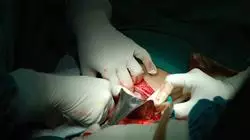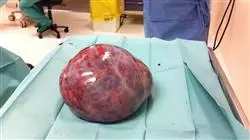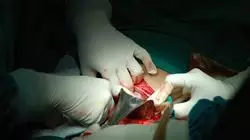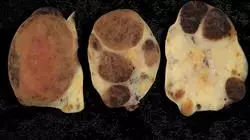University certificate
The world's largest faculty of medicine”
Description
New circumstances in gynecologic oncology have pushed us to develop new educational programs that meet the real needs of experienced professionals, so that they can incorporate the latest advances into their daily practice"

There are a variety of tumors in the female genital tract, which, due to their low incidence, are relatively unknown to professionals, and to which not much time is devoted in preparation programs on a regular basis, although they are no less lethal for patients. Proper response and improved prognosis in each case are two factors that depend on continued professional development.
This program was born out of the need for specific expertise in the etiopathogenesis, diagnosis and treatment of rare gynecologic tumors, and the requirement for specific accreditation in this field in order to select adequately skilled professionals.
This postgraduate diploma is aimed at providing up-to-date courses of action for patients with rare gynecologic tumors. In addition, thanks to this postgraduate diploma, the specialist will be able to conceptually manage the principles of tumor biology and targeted medical treatments, as well as other issues related to the diagnosis and treatment of Rare Gynecologic Tumors.
This Postgraduate Diploma will allow you to learn about the latest advances in Rare Gynecologic Tumors using the latest educational technology"
This postgraduate diploma in Rare Gynecologic Tumors contains the most complete and up-to-date scientific program on the market. Its most notable features are:
- The examination of clinical cases, recorded with POV (Point of View) systems from different angles, presented by experts in gynecology and other disciplines The graphic, schematic, and practical contents with which they are created, provide scientific and practical information on the disciplines that are essential for professional practice
- Presentation of practical workshops on procedures and techniques.
- An algorithm-based interactive learning system for decision-making in the clinical situations presented throughout the course.
- Action protocols and clinical practice guidelines, which cover the most important latest developments in this specialist area.
- All of this will be complemented by theoretical lessons, questions to the expert, debate forums on controversial topics, and individual reflection assignments.
- Special emphasis on test-based medicine and research methodologies in oncology
- Content that is accessible from any fixed or portable device with an Internet connection
This postgraduate diploma may be the best investment you can make when selecting a refresher program, for two reasons: in addition to updating your knowledge on Rare Gynecologic Tumors, you will obtain a postgraduate diploma from TECH Global University"
The teaching staff includes a team of renowned gynecologists and oncologists, who bring their professional experience to this program, in addition to recognized specialists belonging to leading scientific societies.
The multimedia content developed with the latest educational technology will provide the professional with situated and contextual learning, i.e., a simulated environment that will provide an immersive training program to train in real situations.
This program is designed around Problem-Based Learning, whereby the specialist must try to solve the different professional practice situations that arise throughout the program. For this reason, you will be assisted by an innovative, interactive video system created by renowned and experienced experts in the field of gynecology and oncology with extensive teaching experience.
This refresher program will generate a sense of cassuarnce in decision making for rare gynecologic tumors, and will help you grow professionally"

Incorporate the latest developments in the approach to rare tumors into your daily practice and improve the prognosis of your patients"
Objectives
The main objective is oriented to allow the incorporation of the advances that are taking place in the approach to uterine sarcoma, so that the specialists can update their knowledge in a practical way, with the latest educational technology and adapting the educational process to their real needs.

Enhance your professional skills by getting up to date in the management of Rare Gynecologic Tumors"
General Objective
- Update specialist physicians on the procedures and techniques for rare gynecologic tumors, incorporating the latest advances in the discipline to improve daily medical practice and patient prognosis.
Specific Objectives
Module 1. Biological Basis of Cancer
- Recognize and understand the molecular bases of carcinogenesis as well as its development and metastasis production
- Define the basis of cellular growth regulation
- Understand the role of carcinogens in the formation of genital cancer
- Gain up-to-date knowledge of cancer genetics
- Understand the cellular mechanisms of programed cell death and apoptosis and their relationship and activity with malignant pathology
- Interpret the mechanisms of cancer production and distant metastatis at a molecular level
- Identify the origins of genetic alterations that provoke cancer
- Identify the epigenetic changes and oncogenes related with genital tract tumor pathology
- Explain the mechanisms tumor neoformation in blood vessels
- Recognize respiratory symptomatology, such as that caused by pleural effusion, in the treatment of gynecologic cancer
Module 2. Basis of Chemotherapy Treatment, Adverse Affects and New Therapies
- Identify the essentials for the use of chemotherapy in gynecologic oncology as well as adverse effects and complications
- Identify the basic factors that are involved in chemotherapy treatment
- Highlight the influence of chemotherapy in the cellular cycle
- Identify the action mechanisms of antineoplastic agents
- Recognize the mechanisms for the resistance of medical treatments in gynecologic cancer
- Gain up-to-date knowledge of toxicity and side effects
- Review the available antineoplastic drugs and their characteristics
- Identify cases in which patient observation can be used without using adjuvant treatment
- Understand the role of new tests such as positron emission tomography for cervical cancer
- Evaluate the role of tumor markers such as SCC
- Acquire up-to-date knowledge of the role of laparoscopy in performing a radical hysterectomy and the para-aortic lymphadenectomy for non-early tumor stages
- Evaluate the use of medical and surgical therapy in mestastatic, recurrent or persistent illness
- Study and analyze the postoperative care of patients to identify any complications early on
- Appropriately assess the role of chemotherapy in gestational trophoblastic disease
- Manage the progression of pelvic tumor disease in the most effective way
Module 3. Uncommon Gynecologic Tumors
- Identify the different types of less common genital tumors and the corresponding treatment and evolution
- Revise the clinical manifestations and diagnosis of vaginal cancer
- Review the different histological types and classify the different types of vaginal cancer
- Evaluate and create an appropriate diagnostic and management plan for vaginal cancer
- Establish the follow-up plan for vaginal cancer to be able to detect and recurrences
- Identify the prognosis for each type of vaginal cancer
- Review the epidemiology of gestational trophoblastic disease and the clinical features of hydatidiform mole
- Study the clincial characteristic of gestational trophoblastic neoplasia
- Appropriately evaluate the different forms of gestational trophoblastic disease with imaging techniques
- Gain up-to-date knowledge of the histologic shapes of molar and invasive forms
- Appropriately perform staging of placental invasive disease
- Study the different types of surgical treatment suitable for treating the different forms of molar disease in pregnancy
- Recognise and implement the most appropriate methods for follow-up treatment of molar disease in pregnancy
- Appropriately classify the prognosis of gestational trophoblastic disease
- Identify and assess the different tumors that can metastasize in the female genital tract
- Study the way to deal with metastasized cancers in the genital tract
- Analyze and treat neuroendocrine tumors in the female genital tract
- Review the management of rectovaginal septal tumors, as well as the symptomatology associated with gynecologic tumors
- Evaluate the pain, the different types and the treatment of these types of tumors
- Assess the presence of ascites in the context of gynecologic tumors in an appropriate way
- Classify edema and manage it appropriately
- Identify deep vein thrombosis and evaluate the most appropriate anticoagulant treatment for each case
Module 4. Fertility Preservation
- Determine the different fertility preservation techniques in young patients and their oncological implications
- Identify the options for preserving fertility in gynecologic cancer, as well as gamete preservation
- Revise the surgical techniques for preserving fertility in each of the cancers affecting the female genital tract
- Update on the management of pregnant patients with gynecologic cancer
- Review new options for preserving ovarian tissue
- Gain up-to-date knowledge on the current status of uterine transplantation and the most recent results obtained to date
- Module 5. Palliative Care and Nutrition
- Study and understand the basis of palliative care and terminal phase of an oncological illness
- Evaluate the usefulness of PET-CT for the assessment of metabolism in suspected malignant lesions
- Gain up-to-date knowledge of gastrointestinal symptomology
- Identify the distant metastasis and assess how to manage it
- Describe the indications and the surgical technique specific to palliative pelvic exenteration
- Comprehensive care of a dying patient and learning how to help them in the final phase of the disease
- Study and treat patients with anxiety and depression in a specific way

Take the opportunity to learn about the latest advances in this field in order to apply it to your daily practice"
Postgraduate Diploma in Infrequent Gynecologic Tumors
Prevention and early treatment of diseases related to the female reproductive system are essential to preserve women's health. However, there are rare cases of gynecological tumors that require specific and updated knowledge for their correct approach. At TECH Global University we are concerned about the comprehensive preparation of health professionals, therefore, we have designed the Postgraduate Diploma in Infrequent Gynecological Tumors, with the aim of providing the professional with the necessary tools to diagnose and effectively treat these rare pathologies. Participants will learn about the particularities of each of the uncommon tumors that affect the female reproductive system, including granulosa cell tumors and borderline ovarian tumors, among others.
Get trained in the care of rare gynecological tumors.
This TECH program focuses on providing high quality training, which is tailored to the needs of students and allows them to develop their skills optimally. Our team of highly trained professionals will guide participants and provide them with the necessary knowledge and skills to apply in their daily practice. In addition, each participant will have access to up-to-date study materials and state-of-the-art technological tools, which will allow them to make the most of their learning experience. At the end of the program, each will have mastered the application of advanced techniques for the diagnosis and treatment of these tumors, including laparoscopic surgery and personalized chemotherapy. In this way, the health professional will be able to offer a comprehensive and humanized treatment to patients with these pathologies.







